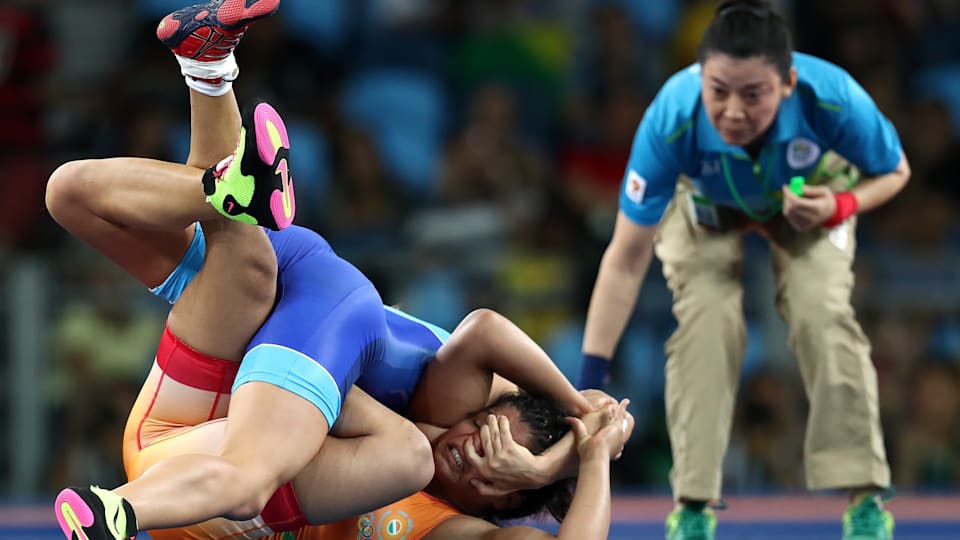Repechage in wrestling and other sports explained - the second chance

Though primarily associated with wrestling, repechage is also used in various other sports and will be introduced in select athletics events at the Paris 2024 Olympics.
Over the past decade-and-a-half, repechage has become a very familiar word in sports.
Derived from the French word repecher, which means to fish out or rescue, repechage broadly refers to a second chance for contestants, who narrowly failed to meet the qualifying cut-offs, to continue in a competition.
In the realm of Olympic sports, repechage is mostly associated with wrestling, where it has a very direct hand in deciding medal winners.
Repechage in wrestling
Repechage was first used in Olympic wrestling when the direct knockout format was introduced at Beijing 2008. It has been a part of both freestyle and Greco-Roman wrestling since.
Essentially, the two bronze medals in Olympic wrestling events are decided through repechage. The repechage system is also used in every major wrestling competition around the world unless a particular division has seven or fewer competitors and follows the Nordic System.
How repechage in wrestling works
Suppose wrestler A and wrestler B makes it to the final of a particular weight class.
En route, wrestler A defeated W in the first round, X in the second round, Y in the quarter-finals and Z in the semi-finals of his bracket.
In such a scenario, W, X, Y and Z enter the repechage round to decide the bronze medal for that particular bracket. W and X will face off in the first round of repechage and the winner will go up against Y in the second round of repechage. Z, the loser in the semi-finals, faces the second-round repechage winner directly in the bronze medal match.
A similar scenario will also play out to decide the bronze medal winner in the bracket which saw wrestler B make the final or gold medal match.
Repechage in wrestling will come into play in any weight class with more than 16 wrestlers competing. All wrestling events at the Olympics feature 16 contestants.
The system ensures that a good wrestler who may have been drawn against a top opponent in the earlier rounds isn’t penalised for being handed a tough draw and gets a second crack at a medal.
Four of India’s seven Olympic medals in wrestling have been won through repechage. Sushil Kumar (bronze at Beijing 2008), Yogeshwar Dutt (bronze at London 2012), Sakshi Malik (bronze at Rio 2016) and Bajrang Punia (bronze at Tokyo 2020) capitalised on their second chance.
Taekwondo and judo, two other Olympic martial arts disciplines also use repechage. While taekwondo shadows the wrestling system, judo uses a minor variation where the quarter-final and semi-final losers get pulled into the repechage.
Repechage is also used in various other sports to serve different purposes.
In rowing, repechage gives rowers or teams who failed to make the cut for the quarter-finals directly through the heats a second chance to advance. Keirin and sprint events in track cycling also uses repechage rounds for a similar goal.
Unlike wrestling, taekwondo or judo, though, it has less of an impact in deciding medals.
Qualification for the Rugby Union World Cup and the Rugby League World Cup also use repechage.
The Major League Baseball (MLB) Wild Card Series and the Play-in tournament of NBA basketball seasons are also essentially repechage systems.
Repechage in athletics
Starting from the Paris 2024 Olympics, repechage rounds have also been added to all individual athletics track events from 200m to 1500m (including hurdles).
Under the new repechage format, athletes who do not make the cut for the next round based on their finishing positions in round one heats will have a second chance to qualify for the semi-finals by participating in repechage heats.
This will replace the earlier system, where athletes would advance through fastest times, sometimes known as 'lucky losers', in addition to the top placings in the heats.
These 12 events (men’s and women’s 200m, 400m, 800m, 1500m and 400m hurdles as well as the men’s only 110m hurdles and women’s only 100m hurdles) will now comprise four rounds - round one heats, repechage round, semi-finals and final - instead of three from yesteryears.
There will be no repechage round in the 100m events as the event already has the preliminary heats before round one. Long-distance events won’t have repechage rounds either to allow runners proper recovery time between rounds.